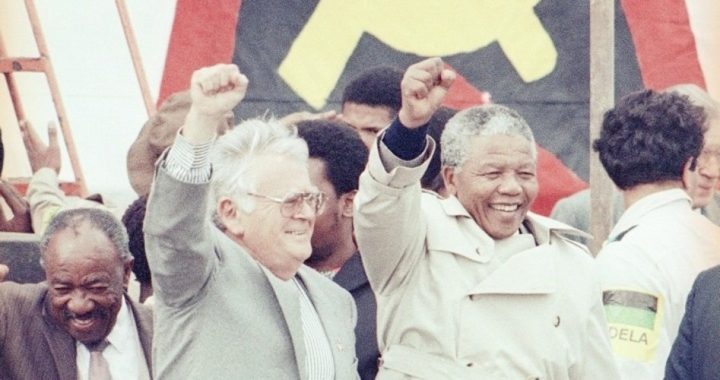
Despite decades of Nelson Mandela denying that he was an official member of the South African Communist Party (SACP) during his Soviet-backed war on the Apartheid government, evidence uncovered recently by British historian Stephen Ellis shows otherwise. The new research confirmed that not only was the African National Congress (ANC) leader a member of the SACP, he may have actually been a senior official working with the party’s Central Committee.
Still, for 50 years, while admitting that he was influenced by Marx and other communist luminaries, Mandela has denied — in public, at least — that he was an actual member of the Communist Party. But now, documents discovered at the University of Cape Town by Stephen Ellis, a professor based at the Free University of Amsterdam, completely contradict Mandela’s bogus claims.
Among other evidence, Ellis found minutes from a secret SACP meeting of top leaders in 1982. The papers document a high-level Communist Party functionary’s discussion about Mandela having joined the SACP around 20 years earlier. That would mean he joined in the beginning of the 1960s, probably 1961 or 1962, well before he was prosecuted for, among numerous other crimes, membership in the outlaw party backed by some of the most ruthless tyrants on the face of the Earth.
“There was an accusation that we opposed allowing Nelson [Mandela] and Walter [Sisulu, a fellow activist] into the Family [a code word for the party],” Communist leader and SACP Central Committee member John Pule Motshabi was quoted as saying in the minutes. “We were not informed because this was arising after the 1950 campaigns [a series of street protests]. The recruitment of the two came after.”
Experts including Ellis, who first identified and publicized the documents, said it was some of the most compelling evidence to date proving that Mandela was actually a member of the SACP. However, some analysts attempted to dismiss the new finds as insignificant, portraying the former South African president’s party membership as a mere alliance of convenience that was supposedly necessary to overthrow the existing government.
Had the proof been more widely disseminated decades ago, though, it would have been much harder for the Western establishment, including the U.S. government, to openly join forces with communist tyrants to support the controversial figure in his often-brutal guerrilla war. Indeed, if the world had only been paying attention, the signs would have been obvious to even a casual observer.
Today, if the truth had been known back then, South Africa might be a very different place, too. As The New American reported recently in a series of articles citing some of the world’s foremost authorities on the subject, the so-called “Rainbow Nation” is currently facing the threat of both genocide and full-blown communism as white farmers are massacred and ANC-SACP politicians plot more robbery.
In Ellis’ mind, though, Mandela was simply advancing his own cause, not the communist conspiracy. “He knew and trusted many Communist activists anyway, so it appears he was co-opted straight to the central committee with no probation required…. But it’s fair to say he wasn’t a real convert, it was just an opportunist thing,” the historian implausibly claimed in an interview with the U.K. Daily Telegraph, which first publicized the explosive revelations over the weekend before they were picked up by media outlets worldwide.
Despite uncovering the new evidence and publishing it in his book, External Mission: The ANC in Exile, 1960-1990, the author, also a former researcher for Amnesty International, continually attempted to downplay the significance of his own findings throughout the interview. “Nelson Mandela’s reputation is based both on his ability to overcome personal animosities and to be magnanimous to all South Africans, white and black, and that is what impressed the world. But what this shows is that like any politician, he was prepared to make opportunistic alliances,” Ellis claimed.
Critics of the efforts to minimize the significance of Mandela’s party membership, however, vehemently disagreed, blasting the “whitewashing” and pointing out that the reality is far different from the rosy picture being painted by the establishment press and other ANC-SACP apologists. “Communist parties are dogmatic organizations. They never move anyone up to the central committee unless they know them to be die-hard Communists,” explained anti-communist analyst Daniel Greenfield in a piece for FrontPage magazine. “If Mandela was in the central committee, then he was a longtime member in good standing who had proven himself.”
Of course, Mandela has long been accused of being a member of the SACP, even by multiple party officials, going back about five decades. His wife Winnie was famous for being a rabid proponent of “necklacing.” The brutal punishment, used against fellow blacks who disagreed with the ANC, involved placing a burning tire filled with gasoline around a victim’s neck that killed slowly and painfully.
During Mandela’s prosecution for sabotage and treason, prosecutors also produced a document written by the controversial figure in which he actually boasted of being a Communist Party member. On being released from prison, Mandela proclaimed at a rally: “I salute the South African Communist Party for its sterling contribution to the struggle for democracy.” He appeared (and was photographed) at multiple rallies with SACP boss Joe Slovo in front of a giant hammer and sickle.
The ANC and its terrorist wing, founded and led by Mandela, were dominated by the Communist Party as well, and the influence goes back decades. “No major decision could be taken by the ANC without the concurrence and approval of the Central Committee of the South African Communist Party,” former ANC and SACP leader Bartholomew Hlapane testified before the U.S. Congress before being executed by an assassin. Support from the communist terror regimes ruling China, Cuba, and the Soviet Union for Mandela, his ANC, and the SACP is also a matter of historical record.
Today, unsurprisingly to analysts who were paying attention two decades ago, the ANC rules South Africa in an unholy alliance with the SACP and an umbrella group for labor unions. Numerous top officials, including recent ANC presidents, have publicly admitted to also being members of the SACP. South Africans of all colors are now paying the price.
With the former president reportedly suffering from a lung infection, however, a spokesman for the Nelson Mandela Foundation attempted to downplay the most recent evidence. “We do not believe that there is proof that Madiba (Mandela’s clan name) was a Party member,” the representative was quoted as saying by the Telegraph. “The evidence that has been identified is comparatively weak in relation to the evidence against, not least Madiba’s consistent denial of the fact over nearly 50 years. It is conceivable that Madiba might indulge in legalistic casuistry, but not that he would make an entirely false statement.”
However, he stopped short of issuing a complete and total denial. “Recruitment and induction into the Party was a process that happened in stages over a period of time,” the spokesman continued. “It is possible that Madiba started but never completed the process. What is clear is that at a certain moment in the struggle he was sufficiently trusted as an ANC leader to participate in Party CC meetings. And it is probable that people in attendance at such meetings may have thought of him as a member.”
Experts, though, even among Mandela supporters and apologists, are not buying the excuses. “The evidence that Stephen Ellis refers to about Mandela’s membership of the Communist Party is pretty definitive,” noted University of Limerick Professor Tom Lodge, an expert on African politics. “It is based upon recollections of party members, some of whose testimony is derived from first-hand experience.”
The latest information exposed in Ellis’ book also confirms once again that the ANC was receiving broad support and training from assorted communist dictatorships, including the terror regime ruling East Germany, as it waged a bloody guerrilla war against the anti-communist government and its suspected black supporters. According to evidence he uncovered, East German operatives trained ANC goons to torture and murder the group’s own members as suspected spies if they questioned the terror organization’s dogma.
Unlike President Obama, who was awarded his Nobel “Peace Prize” before going on a killing spree stretching from Yemen and Libya to Afghanistan and Syria, Mandela was awarded his prize in 1993, well after he helped found and lead a formally designated terrorist group known as Umkhonto we Sizwe, or “Spear of the Nation.” Whether Mandela’s now-officially documented membership and even leadership in the SACP will tarnish his image among die-hard supporters or the increasingly discredited Nobel Committee, however, remains to be seen.
Alex Newman, a foreign correspondent for The New American, is currently based in Europe. He can be reached at [email protected].
Photo of SACP boss Joe Slovo with Nelson Mandela at April 29, 1990 rally: AP Images
Related articles:
Genocide and Communism Threaten South Africa
Socialist International Congress Hosted by ANC Amid Genocide Alert
South African Tells of Genocide in Communist-dominated South Africa



